Thursday, November 3rd 2016

Intel Core i5-7600K Tested, Negligible IPC Gains
Ahead of its launch, a Core i5-7600K processor (not ES) made its way to Chinese tech publication PCOnline, who wasted no time in putting it through their test-bench, taking advantage of the next-gen CPU support BIOS updates put out by several socket LGA1151 motherboard manufacturers. Based on the 14 nm "Kaby Lake" silicon, the i5-7600K succeeds the current i5-6600K, and could be positioned around the $250 price-point in Intel's product-stack. The quad-core chip features clock speeds of 3.80 GHz, with 4.20 GHz max Turbo Boost frequency, and 6 MB of L3 cache. Like all its predecessors, it lacks HyperThreading.
In its review of the Core i5-7600K, PCOnline found that the chip is about 9-10% faster than the i5-6600K, but that's mostly only due to its higher clock speeds out of the box (3.80/4.20 GHz vs. 3.50/3.90 GHz of the i5-6600K). Clock-for-clock, the i5-7600K is just about 1% faster, indicating that the "Kaby Lake" architecture offers only negligible IPC (instructions per clock) performance gains over the "Skylake" architecture. The power-draw of the CPU appears to be about the same as the i5-6600K, so there appear to be certain fab process-level improvements, given the higher clock speeds the chip is having to sustain, without a proportionate increase in power-draw. Most of the innovation appears to be centered on the integrated graphics, which is slightly faster, and has certain new features. Find more performance figures in the review link to PCOnline below.
Sources:
PCOnline.com.cn, WCCFTech
In its review of the Core i5-7600K, PCOnline found that the chip is about 9-10% faster than the i5-6600K, but that's mostly only due to its higher clock speeds out of the box (3.80/4.20 GHz vs. 3.50/3.90 GHz of the i5-6600K). Clock-for-clock, the i5-7600K is just about 1% faster, indicating that the "Kaby Lake" architecture offers only negligible IPC (instructions per clock) performance gains over the "Skylake" architecture. The power-draw of the CPU appears to be about the same as the i5-6600K, so there appear to be certain fab process-level improvements, given the higher clock speeds the chip is having to sustain, without a proportionate increase in power-draw. Most of the innovation appears to be centered on the integrated graphics, which is slightly faster, and has certain new features. Find more performance figures in the review link to PCOnline below.
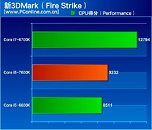
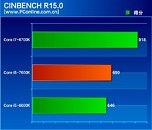
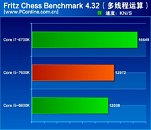
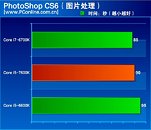
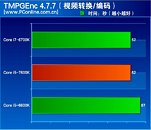
116 Comments on Intel Core i5-7600K Tested, Negligible IPC Gains
Either way amd wont have to bring a miracle to shake things up and grab a piece from market it lost - just a Sandy Bridge level (5 years old) IPC and little les priced that intels (whatever gen).
AMD on the other hand doesn't release architecture improvements but gives something more. If Zen is not as fast as Skylake or Kaby so what? It will have price 2 times lower and the difference between Intel and AMD wont be big either. Besides after Zen other stuff is coming. What will intel do is release something after Kaby another worthless 1% of improvement or even cross as THE first one the improvement lowest values of 0.5% :P. Someone said that intel, since release of Kaby isn't much different from Skylake mean that Intel is not afraid of AMD's Zen. Maybe. Or maybe Intel wants to release worthless Kaby to get a little bit more money out of the consumers offering nothing before its fall-down. I got an Intel 3770K I7 and the difference between the 6th or 7th generations of intel's CPUs is thin as hair.
Market leaders (3Dfx for example) can screw up and disappear, although that's unlikely to happen with Intel any time soon (or Apple for that matter), but some of the leaders in technology industry (Nokia, Blackberry) make a few too many missteps and all of a sudden they're no longer relevant and have lost billions. Just look at how good Intel did in the mobile phone space after spending a lot of money on trying to compete in a market they were clueless about. Throwing money on a problem doesn't always solve it. Intel has yet to do a decent iGPU, despite all the money and effort the company has put into it. They brag about how much better their latest graphics core is compared to their last one, but in this space, AMD is always three steps ahead. Is AMD going to have something competitive this time around, who knows, but we should all hope they do, as it's the only way Intel is going to wake up and realise that they have to improve their CPU's as well.
Intel has and always had technological advance and also resources. Their product bet on Netburst failed, and Keller brought last goods from Alpha team thus the sparks with decent AMD products. Ranting about someones age seems to be a sign of one selves lack of sanity.Sandy vs Ivy? Really? Sandy differs especially in OC and soldered IHS and Ivy is the bare minimum... give us a break, people are still spanking anything that AMD has running overclocked Nehalems and they ARE enough.
AMD is unpredictable and innovative while intel predictions oscillate with 1% boost.
AMD is our only hope right now.
The worst bit of course, is that Intel knows better than we do what AMD has with Zen, so if it hasn't bothered to improve the performance much, then that implies Zen is another AMD failure and nothing to worry about for them. I really hope I'm wrong.
It wouldn't surprise me if Intel start doing rebrands like is done with GPUs.
I fully expected this to be a 'Devil's Canyon' type of increase. ;)
You know what IS annoying, either I don't know how to use this forum properly or we need to click on EACH AND EVERY picture in the first post to see it.. can't even click left or right to go through them? I have to back out then click on another? Wow......
Secondly, yes, Sandy Bridge is getting old www.anandtech.com/show/9483/intel-skylake-review-6700k-6600k-ddr4-ddr3-ipc-6th-generation/16
Sure, if you overclock it, it'll hang around a bit longer, but Ivy Bridge is clearly better where Sandy Bridge lags behind.
Did I say people should upgrade? No, I simply said that Sandy Bridge is starting to get a bit past its prime, in more ways than one.
We have to wonder what new instruction sets and or hardware are they adding to speed other functions, and we may be reaching the bridge of OpenCL being required, or perhaps smaller higher frequency RISC cores for specific computing applications.
I mean I was playing Civ 5 with iGPU on i5-6200U.
I guess Intel doesn't see Zen as a threat or they are bringing improvements for Cannonlake.
Additionally, put on some ads and upgrade incentives and people will upgrade.
And there are those who must have the latest no matter how silly it is.
There is a good chance that 3 years ago Intel didn't see Zen as a threat, but now it seems like they are getting a little worried. They wouldn't have released 8 and 10 core i7's unless they needed the option of a stronger chip to counter competition (They can easily drop the prices of their enthusiast i7's by $500 if they need to).
But if that's not enough then Intel is basically screwed for a year. Their roadmaps are set. The most they can do is make i7's with MoAR CoReZ!
Maybe we've been spoiled all these years with new architectures bringing lots of gains and new technologies plus better overclocking, etc. Kind of like the late 70's and 80's of car production where all of the sudden sedans started hitting 20mpg + with fuel injection and HP increases matched. Then the 90's rolled around and fuel economy and HP gains were nominal.